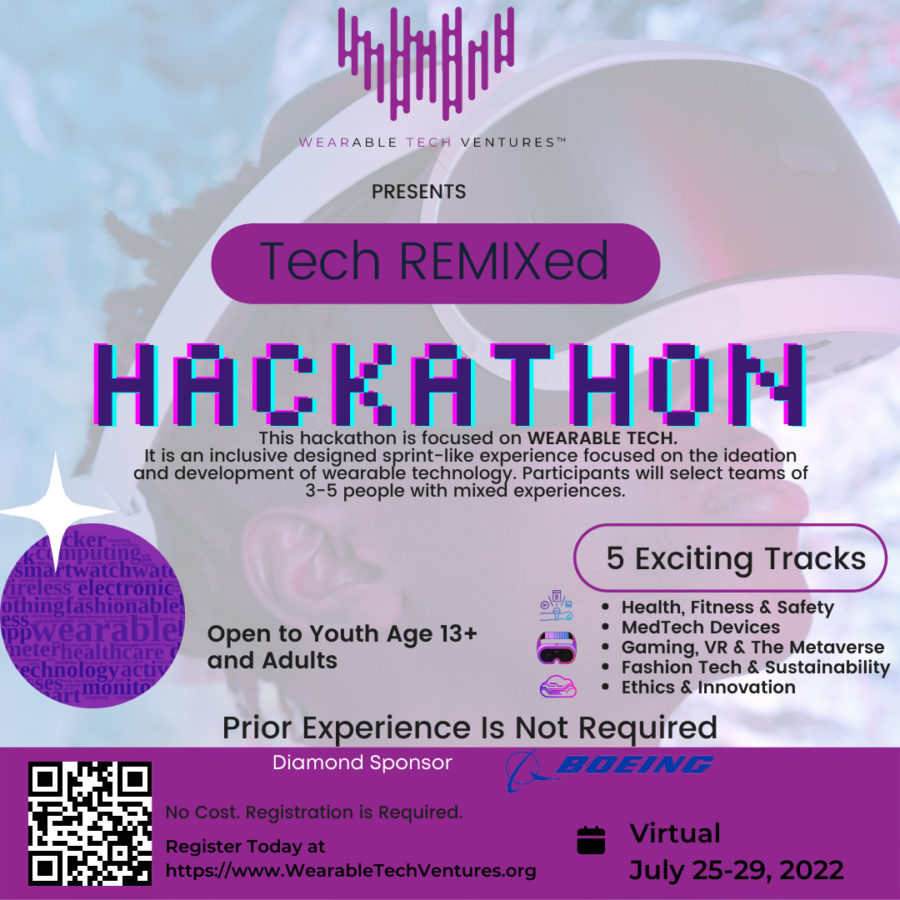LaKisha Greenwade is inviting tech novices, hopefuls and aficionados alike to the TECH REMIXed Hackathon, a virtual five-day hackathon to teach and create awareness around wearable tech.
Greenwade runs Wearable Tech Ventures (WTV), a Baltimore-based network that connects innovators, investors and founders to develop wearable tech products — especially women and people of color. For those that have never thought about the industry or concept of wearable tech: think Apple Watch, Fitbit or Airpods. In its broadest definition, wearable tech is any technology that goes on your body. If you think the industry is just fashion and has no real impact, think about the market revolution created by Airpods and Bluetooth wireless earphones in general. If the wearable technology didn’t exist, your phones would probably still have an earphone jack.
Through Wearable Tech Ventures, Greenwade aspires to create a pipeline for more underrepresented peoples to enter the tech industry. The TECH REMIXed Hackathon is thus a vehicle to bring a broad coalition of people and organizations on board.
The five-day virtual hackathon will start at noon on Monday, July 25, with an opening ceremony. That’s when organizers will introduce the five tracks, in different industries, for which teams will be creating open-source wearable tech solutions. On this first day, teams of three to five will be formed to build their tech solutions out over the week. Teams reconvene Thursday evening and Friday morning to pitch their projects ahead of an awards ceremony that Friday night.
The virtual event will also feature technical experts and recorded technical skills workshops where participants can learn how to develop apps, chatbots and other devices that can eventually lead to a wearable tech product.
Technical.ly chatted with Greenwade to get more insight into what participants can expect to get out of the TECH REMIXed Hackathon.

Technical.ly: What can attendees expect from the hackathon?
LaKisha Greenwade: They can expect a robust virtual experience that feels like they’re connecting with people on a personal level. It will feel like in-person. It will be multimodal from the standpoint of connecting with all of our attendees, from the opening ceremony to the closing ceremony.
So they are basically about to experience an advanced technical and startup-style training from top experts around the country.
We’ve created a metaverse media room for the Baltimore Times and some of the community Black-owned newspapers that will be interviewing people throughout the week. So, folks will have first access to that and they’ll be able to see that in a better version that will be streamed on YouTube and Twitch.
How has the hackathon changed since 2021?
Last year, in 2021, we actually postponed the hackathon and launched a mini-hackathon technical skills training in January to bring an audience together to learn what a hackathon is — and to provide some skillsets that they can use for this July. We have plans to resume that schedule of technical skills training that is a little bit smaller with some sponsored tracks. I know we’re going to be doing something for some of our other partners in January, and then the larger venue will be in July or summertime as we’re doing this year. So, July 2022 — this year is our actual first self-standing wearable tech ventures hackathon, as we’ve postponed everything until this year.
Why is it important to do hackathons like this that invite novices, include youth and welcome attendees of all skill levels to participate?
It’s important because these are folks that are often never invited to the table. The term “hackathons” and the concept is something that many underrepresented folks — from tech professionals and management to engineers and youth — didn’t know what I was talking about. They had never even heard that term. And what I know is that this is an experience that many have never had the opportunity to participate in. They’ve never been invited, or perhaps it was established in such a way where it seemed as if they couldn’t attain or achieve it.
We know that hackathons are prominent around the world, more so on a global scale, and then also at prominent institutions such as MIT. So for us to launch this environment that is accessible, that is not only limited to college students, that provides folks that may have ideas that they’ve always wanted to pursue and just did not know the steps to pursue it…This is unheard of. This is something that is monumental. To my knowledge, this is the first time this has been done around the country, in this particular manner.
We are innovating. We’re creating a new standard. We’re creating access and what we’re not doing is repeating a lot of the problems that people like to repeat as relates to statistics and challenges that are associated with tech and tech diversity and the pipeline attempt.
Is there anything you feel we haven’t talked about? Anything you feel people should know?
This is not a traditional hackathon. This is an experience that was curated by underrepresented people — myself — with underrepresented people in mind. This is special. We have top talent, an amazing technical team, amazing advisors and judges that are coming from Under Armour and Wells Fargo and the [National Institutes of Health].
So this is special to get feedback, to get insight from these particular companies and institutions that actually conduct research and help to develop technical products that are delivered around the world.
This is one-of-a-kind.







